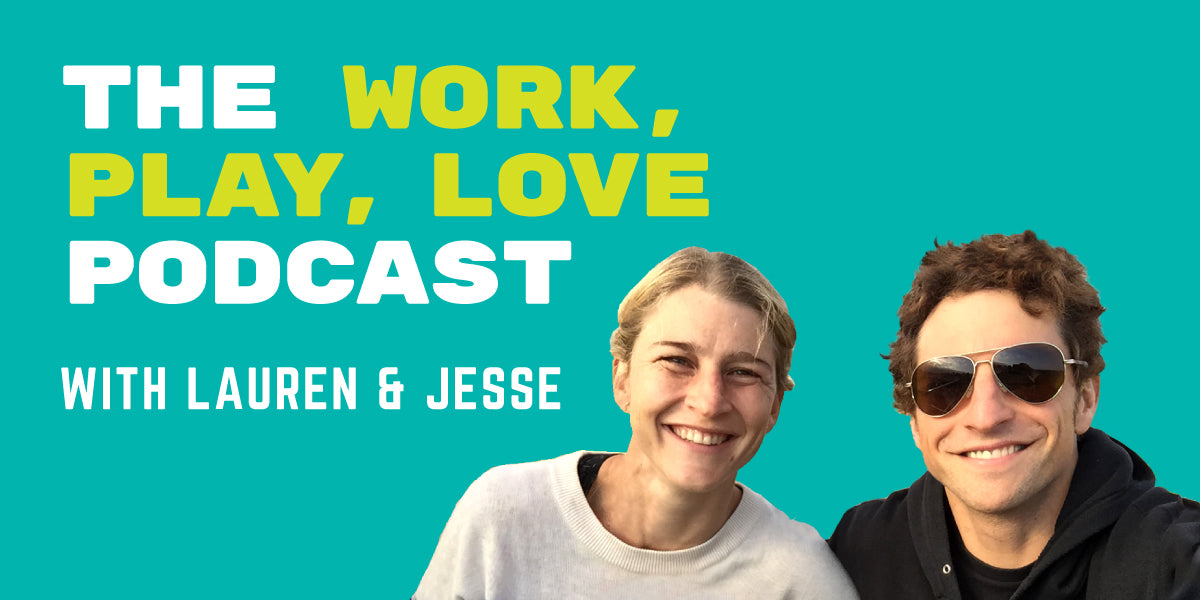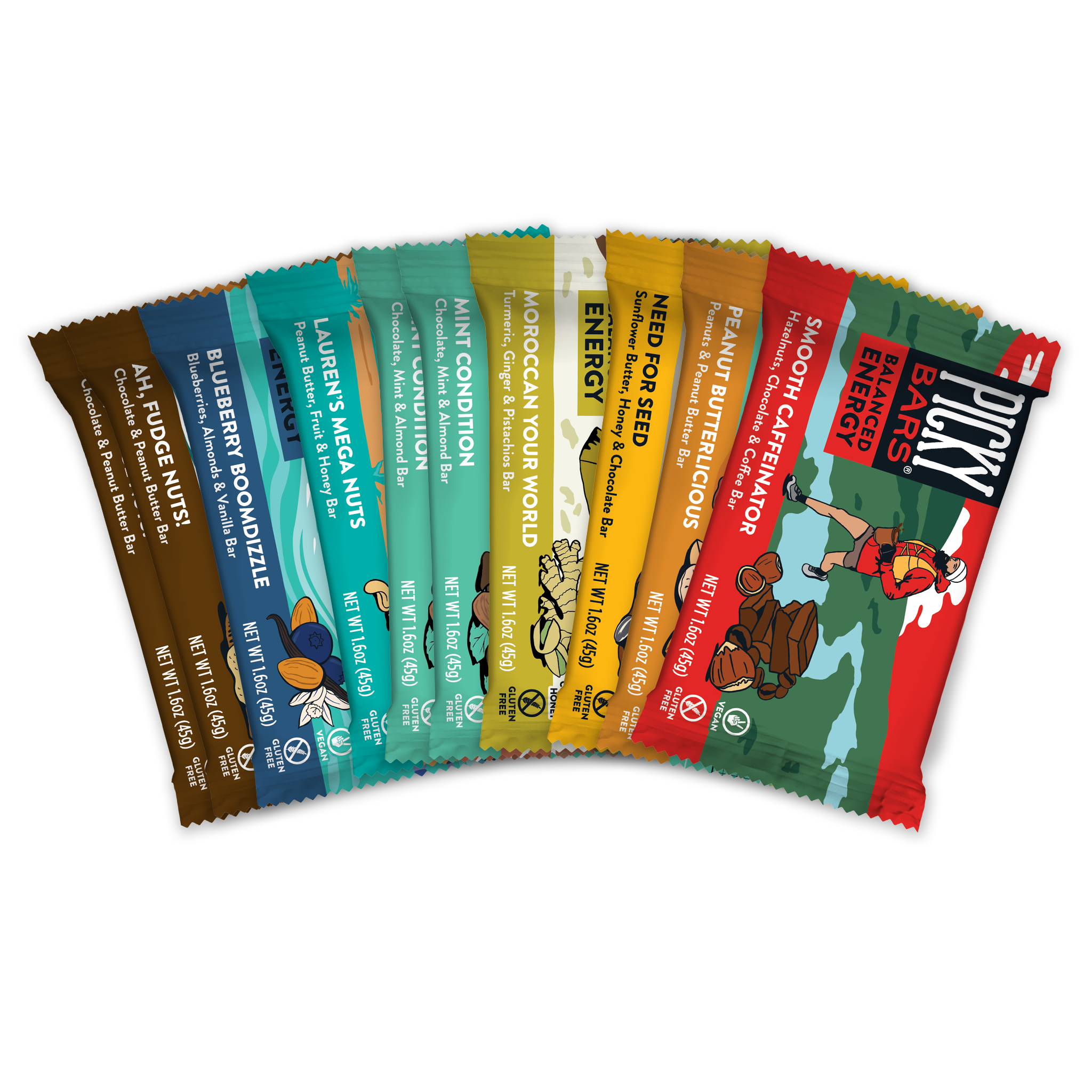

· By Sarah Conklin
39: Rest Days, Competitive Bonds, Moving In
Juggling work-life balance can be a real three-ring circus, which Lauren & Jesse know first hand. Led by listener questions, this new podcast is all about sports, biz, and family. [ASK YOUR QUESTION]
39: Supporting Competitors, Skipping Workouts, Rest Days, Moving In With Your Partner
iTunes | Spotify | Google Play | Stitcher
Description:
It’s been a rough week for the Flomas family. Jesse’s down for the count with a navicular fracture that’s nearly identical to the one he suffered in the opposite foot after Wildflower. Despite getting to zoom around on multiple devices, the injury makes balancing work and family life tough. Negotiating logistics can be hard, and Lauren and Jesse answer questions about how to navigate uncomfortable situations like supporting your competitors, skipping workouts when you’re not feeling it (and what to do the next day), finding balance on rest days, and moving in with your partner. Plus, Jesse and Lauren share new developments learned over the past week, and talk about how the injury is impacting home and Picky life. On top of that, Jesse experienced an illness that gives a new name to “man cold,” and Lauren and Jesse announce a new job opening at Picky Bars.
Warm-up laps
13:56 - I am wondering if either of you (maybe Lauren because she’s had IT band problems before) have ever felt like your ITB is “wiggling” or moving while you are running. I’ve had ITB problems in the past and in getting back into running I sometimes get this feeling (usually it acts as a tell, that I’m tight or need to roll) but no PT has been able to explain it to me – a lot of them say that it’s all in my head. Obviously an answer or solution to this would be great, but hearing that I’m not crazy and this has happened to someone else before would be even better.
J: I haven’t ever felt a “wiggling” feeling, but maybe a clicking? IT-Band issues are no joke, though. So make sure you stay on top of it.
L: I’ve felt a clicking before, too. I would say roll the TFL (Google that!).
15:46 - Lauren, which coaches do you admire the most/turn to for advice?
L: My primary advisors are Bob and Sarah Lesko. My old coaches—Vin Lananna, Mark Rowland, and Dina Evans—I’ve leaned on them before, and will probably lean on them more in the future.
16:48 - What is an appropriate definition of "sub-elite"? I guess to simplify, I'll ask in the context of marathon runners. It seems like anyone who has BQ'ed can call themselves "sub-elite" without any pushback, but I find that ridiculous. Can you weigh in?
L: This might sound…elitist. But I do think that the term “sub-elite” is over-used. Linguistically anyone who is not as fast or faster than an “elite” athlete is..sub-elite.
J: We use the term “elite athlete” because “professional is not always an accurate descriptor for people who are vying to compete on the national level. There are plenty of runners who compete on the national level who make no money from running, so that’s why the term “elite” even really exists.
L: To me, elite athletes represent the top 1-2% in their field. Colloquially, we use the term “sub-elite” to describe folks who are on the verge of breaking into that top tier.
20:05 - I'm training for my first tri at the beginning of May and while I know most people don't say this, swimming is actually my favorite (after running of course)! But I still feel as though I'm struggling on the bike a bit. Do you have any recommendations for books geared towards beginners and cycling?
J: The only books I would recommend here are those written by my coach, Matt Dixon.
21:51 - What are acceptable places to change for a run? As an endurance athlete and work-play-love balance master, I often find myself somewhere to run with no place to change. Have you guys ever found yourselves in this situation? What is your take on changing in the car? Public restroom? Porta potty? Am I missing any? Would love your input because I always feel wierd doing it, but I love saving time.
L: As long as you’re not out there flashing your butt around, all these places are fair game. Just be mindful of the who and what of your surroundings. But I’ve definitely done a bunch of car changes—I prefer changing in the back seat. I’ve definitely done public restroom changes, but porta-potties kinda gross me out.
J: Absolutely – I’ve changed in all these places as well.
The Meat and Potatoes
24:44 - I wanted you to discuss further "The Shalane Effect." What I'm referring to is Shalane Flanagan and her approach to teamwork and elevating those around her by supporting each other in her running circle. I have noticed from the podcasts the same philosophy in Lauren's coaching and Little Wing team, and wanted to ask how we can apply this on a more local level. I am the father of an 11-year old competitive swimmer. She (and from what I've noticed) some of her age group rivals/teammates struggle with forming bonds of friendship, because, as I have observed, seem to be obsessed with beating each other. They give the conciliatory hand-shake of sportsmanship after a race, but rarely do I see them working to truly support each other. Although the coaches do consistently teach the value of teamwork, friendship, etc, as do we, her parents, how can we get these girls, and athletes in general, to be more supportive of each other? On the one hand, she beams with pride when beating her rivals in a race, but on the other, laments at those who beat her and then, sadly, explains that she feels like she doesn't have any friends. How can we as individual parents, starting at home, help turn this around? Being a natural introvert, she's not the type to take the lead, so how does one overcome this as well?
L: I think it’s important to point out that “The Shalane Effect” came later in her career when she was more mature. She may have always celebrated with teammates, but it’s hard to say. I think this is pretty tough for swimmers in particular, because in the sport you’ve got your head under water. There aren’t as many opportunities to hang out get develop a more personal rapport with your team mates. I would recommend showing her examples of team mates supporting each other – like in a women’s soccer game or some other professional women’s sports team. Your daughter will see how these teammates lean on each other to lift each other up.
J: I agree—looking at elite athletes and how they treat their teammates is inspiring to me. I love how LeBron James regards his teammates and competitors. And like Lauren said, I think showing a women’s team sport can be great—in fact I think there’s a YouTube video of the women’s USA swim team going to the Olympics where they’re supporting and doing fun stuff together.
L: There’s a great piece of wisdom that says you want your competitors to be at their best, because it will bring out the best in you. You want to win. But you want to win when your competition was at their best. And that really stuck with me.
33:47 - From reading or hearing athletes talk about their training, it sounds like it isn't uncommon for high level athletes to decide to cancel a workout because they are struggling to accomplish the essence of the workout. Can you talk about the logistics of skipping a day? What criteria do you use to decide to skip a workout and how do you make sure you don't get carried away with canceling workouts? What do you do with the rest of your workouts that day? If you were doing a track session, would you cancel it and just do a light run or do you just go home? What if you were planning to swim later? Do you cancel that as well? What do you do the following day? Do you try the workout again or do you do whatever else you had scheduled?
J: It really depends on what is going on. If I wake up and I don’t feel very good, I’ll just cancel my workout and take a rest day. I don’t try to make it up. I skip everything I have to do for that day. If it’s the sort of thing where I go out and I have to bail on the workout or during the warmup, I’ll just push that workout to the next day.
L: If you find that this is happening, it’s really good to try and understand why you’re struggling during a workout. Did you not take it easy enough on your rest day? Do you need to change your workout?
39:30 - I always feel really crappy and kinda hungover (even if I haven't had alcohol in months) on my rest days and the day after my rest days until I get through my first workout. I also feel pretty grumpy and am mega snacky most of the day on my rest day. I've heard this is not uncommon and related to hormones and such. I was wondering if either of you ever experience this and if you have any tips or tricks? I could imagine going for a walk or spending some dedicated time stretching/rolling and doing some light core exercises might help me feel better but I could also imagine that my body really just needs to rest and that the crappy feeling is just part of the recovery process.
L: You do say that you always feel crappy, and so the first thing that comes to mind is that you may not be fueling properly on your workout day.
J: It is not uncommon to feel crazy hungry for 24 hours after big sessions. And I agree with all of the fueling tips Lauren provided. I’ll also say that I have felt like this—a lot. So do your best to nourish yourself properly, and be mindful of the workouts you do coming out of feeling this way, too.
45:44 - Advice on moving in with a significant other for the first time? We've been dating a while (4 years) and are moving in together in a few months. We've had good open communication up to this point, but I think the apprehension about such a major life decision is hitting us both! Tips, tricks, expectations in general? I am a runner/morning person, and he is not as much, so any tricks on navigating going to sleep/waking up earlier than your partner on a regular basis?
J: Living with your partner for the first time, or any time really, you will make lots of little compromises that you never expected. And as long as you communicate about those things, they can be little things that you joke about.
L: I’m excited for you because jumping in and living with someone is a big adventure. And I think there’s a lot of over-glamorization about merging your lives together. And that’s just not realistic. You can be romantic and have a great relationship and still be different people with different preferences and it can be great.
Follow-ups
54:25 - Follow up #1
Thank you both for sharing your thoughts about healthy perspectives on body weight while training and racing. This past winter I got into a pretty dark place trying to aggressively lose weight. I eventually convinced myself that my healthy weight was much higher than what I was targeting and that I needed to stop counting calories and go back to normal. I then realized that I had mostly ruined my relationship with food and didn't know what "normal" was anymore. Hearing Lauren talk about her approach of asking herself why she wants a certain food and if that food is the best way to get the nutrients she needs. Now when I want to eat something, I ask myself if I am hungry or bored or seeking comfort. From there I can decide what to eat and how much based on what I need. It is a small mental shift but it has made a huge difference for me. Thanks Lauren!
55:28 - Follow up #2
Teen-aged non-sleeper (Ep 38 13:29): I agree with everything shared and had a couple of things to add. One factor that can affect sleep is the time of the last workout/run. When you exercise in the evening, it may affect your sleep. Next, I have 2 teenage boys (Healthy Sleep Habits, Happy Child was my go-to book when they were young!). To settle them down at bedtime, they listened to the Harry Potter Audio Book. It allowed them to concentrate on an awesome story and decompress. Since it was very familiar to them, it was like a lullaby. It also turned off after 30-40 minutes so they didn't have noise once they were in a deep sleep. Although it wasn't daily, Harry was often played once they hit high school to help with sleep and stress. Having a good book or music that plays as you fall asleep will help relax the mind and body! For some, a white noise machine works great as well!
56:40 - Follow up #3
Sandbagging (Ep 38 56:28): I would make a distinction between sandbagging and exhibiting false modesty. One of my treasured race experiences was standing on the start line of a local 5K with some friends and we all had reasons to be worried about our race. One guy said his allergies were bothering him. Another said his knee had been hurting. Someone else had just had a hard week at work. All of the comments were couched in the language of, "this is why you shouldn't expect much from me today." Two of us ended up getting a personal best and the rest had really good days, too. Afterwards we all had a good laugh about it. Nobody was obnoxious and we all seemed to recognize that this was how we psyched ourselves up for the effort or maybe left ourselves free to run how we felt instead of to some random standard. Contrast that with false modesty when someone claims to be "slow" or "bad" when they normally podium or, even worse, as they are in the process of passing you in a race. Sometimes these runners seem to be refusing to acknowledge that they had a good day because they recognize that they are faster than you and trying to hide it, which is way more insulting than if they just acknowledged that they had a good day and recognized that everyone has their own version of that. It's hard to know how to respond. My favorite way to tweak them is to claim that a course was short because then it pushes them into showing dismay that their "slow" effort was wasted. Nah, I don't do that (much). :)
58:05 - Follow up #4
Athena/Clydesdale divisions (Ep 38 46:36): Hi there! I have a follow up for the question about Athena and Clydesdale divisions at road races. Last year as I was signing up for a half marathon in my hometown I noticed there was an option to sign up in the Athena division. I paused, opened another tab, looked up the previous year's results and realized I stood a chance at placing within the division, so I said what the hell and clicked the box. That race's Athena division was for 140 lbs and up as well and I just kept thinking "is 140 lbs really that big??" Because I'm sitting over here at 15-20 lbs more than that. As it turns out, I did place within the division and got a little trophy and everything. But as soon as they put it in my hand I've felt weird about it and have never displayed it. It felt like a consolation prize. Like oh you're a fat girl but you can run at a half decent pace, so here's your little trophy. I don't think it was meant like that, I think if anything weight divisions in races are seeking inclusion, but because of all the societal factors at play it feels quite the opposite, at least for me. I've never seen a race -require- someone to sign up in a particular weight division so I don't know that it's worth losing too much sleep over, but it does bring up some weird feelings about weight and worthiness and the way we perceive our place in the running community as it pertains to our appearance. At this point it seems like weight divisions point out differences more than they smooth them over.
59:48 - cont.
Just some thoughts on the Athena/clydesdale issues. My athletic abilities and weights have been at multiple different levels over the years. In road racing I've been first and I've been dead last. For my weight I've been in the Athena division at times and not at times. There have been times when I have competed in the Athena Division and place in both the Athena division and my age group. The times I competed in the Athena division I was never embarrassed, felt bad or less. I felt proud that I could represent the more voluptuous athlete and show some folks that possibly had some preconceived notions what curvy folks can do. I enjoy competing in the Athena division and when my weight is in the range I enter in that division. Also the folks in the Athena and clydesdale division are some of the nicest most fun athletes I have ever met. If you want to have a good time hang out with the Athena/clydesdale folks. We have a fabulous time.
1:00.33 - cont.
I have a follow-up response to the Athena/Clydesdale question from episode 38. I too would qualify as an Athena: I'm 5' 10" (a female!) and 150 pounds. This is a healthy weight for my height. When I heard about the definition of Athena athletes as being between 140-160 lbs, or above, I got riled up immediately. I felt personally criticized, as though race directors are saying I'm big, and should be classified differently from other athletes, when I'm objectively "normal." I sat with the feeling a little more though, and realized that my agitation really stemmed from being put in the same class as "heavier" women. I didn't want to be put in the same group as people who are overweight. And that's an ugly bias on my part! Running and athletics generally should absolutely be welcoming of athletes of all sizes and body types. Maybe part of that effort toward inclusion -- for me, and possibly for others -- needs to start with some internal work toward genuinely viewing people of all sizes as equally worthy.
1:01.48 - cont.
This is going to get rambly, so I apologize in advance. I'm about 10lbs shy of qualifying as an Athena athlete, but that is strictly due to my height. (No one has ever called me "bulky" in my life.) A rival of mine who is a similar height but happens to be a bit more muscular just squeaked over that qualifying line and recently won the Athena division at a local race. To me, her registering as an Athena was a huge cop-out. To clarify: we are both in our mid-twenties and have always been competitive age groupers, even winning some small local races. Recently she took some down time and then came back and did this race. When she signed up for the Athena division, she made a big production of patting herself on the back for being "body positive" . . . and then proceeded to crush all the other Athena athletes. In reality, she could have probably placed in her age group, but instead of facing her real competition, she chose to (easily) win this arbitrary division. I don't know exactly what they weigh, but would we be ok with Gwen Jorgensen competing as an Athena Athlete? Allie Kieffer? No! That would be ridiculous! So I say this program is outdated and, in a sport where athletes already can develop an unhealthy relationship with food and their bodies, often trying to fit a mold that doesn't actually exist, it just brings more attention to our differences rather than our similarities.
As always, submit your work/play/love question at pickybars.com/workplaylove - Thanks for listening!

[ PAST EPISODES + DESCRIPTIONS ]





